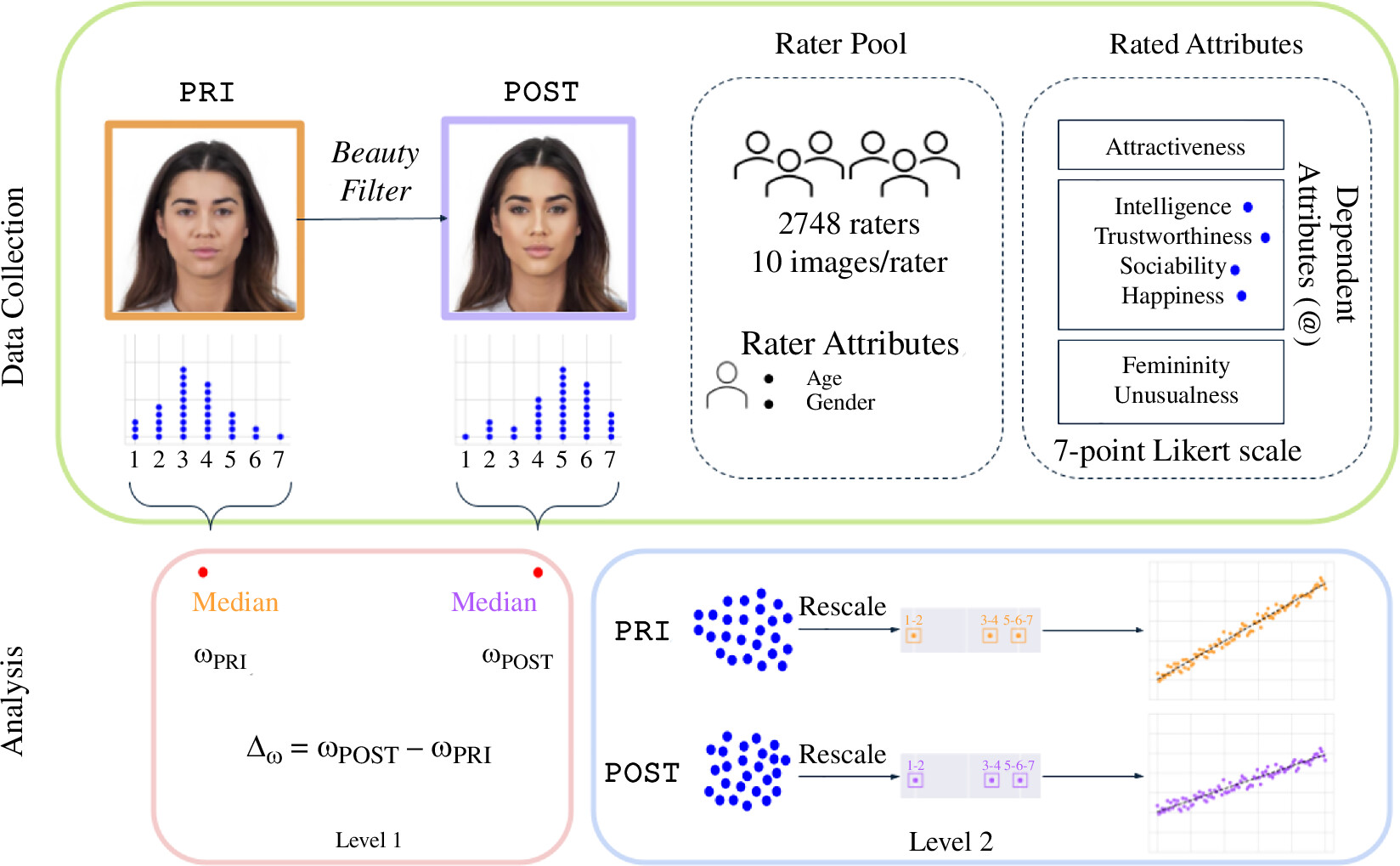A compelling study on the attractiveness halo effect in the digital realm, conducted by researchers from the ELLIS Alicante Foundation and Fondazione Bruno Kessler, and partially funded by the ELIAS project, has been published in the Royal Society Open Science. This landmark research, led by Aditya Gulati and co-authored by Marina Martínez-Garcia, Daniel Fernández, Miguel Ángel Lozano, Bruno Lepri, and Nuria Oliver, examines how AI-driven beauty filters influence perceptions of attractiveness and traits such as intelligence and trustworthiness.
The study has recieved significant international attention, featuring in prominent outlets such as The Guardian, The Telegraph, and Die Welt. With a high Altmetric score placing it in the top 5% of all scored publications, it is clear that the findings resonate across both academic and public spheres.
Addressing a Critical Gap: The Digital Attractiveness Halo Effect
This research tackles an under-explored issue: how cognitive biases shape decision-making in the digital age. Specifically, it investigates the attractiveness halo effect, where perceptions of physical beauty affect judgments of unrelated traits like intelligence or trustworthiness.
In a large-scale online study, 2,748 participants rated images of 462 individuals in two conditions: original and beautified (via AI-based beauty filters). The results? A striking 96.1% of individuals were rated as more attractive post-beautification, with centralised attractiveness scores rising from 3.57 to 5.01 on a 7-point scale.
Key Findings and Their Implications
1. Beauty Filters and Cognitive Bias
- Enhanced Attractiveness: AI-driven beauty filters significantly increased attractiveness ratings across all demographic groups.
- Weakened Halo Effect: The attractiveness halo effect diminished for traits such as intelligence and trustworthiness after beautification, suggesting filters may reduce certain cognitive biases.
2. Unveiling Gender Bias
- Persistent Stereotypes: Women were rated as more attractive than men, but men were perceived as more intelligent—particularly after beautification.
- Implications for Equity: These findings highlight deeply entrenched gender stereotypes, with potential ramifications in professional and social contexts.
3. The Role of Demographics
- Age: Younger individuals were perceived as more attractive, while older individuals were rated as more intelligent and trustworthy—aligning with the well-documented “wisdom bias.”
- Ethnicity: Contrary to earlier studies, this research found that the attractiveness halo effect generalised across ethnicities, even when participants rated individuals of different ethnic backgrounds.
4. Ethical Concerns
The widespread use of beauty filters raises pressing ethical questions:
- Authenticity vs. Artificiality: Filters blur the line between real and artificial self-representation.
- Mental Health Impacts: Regular use of filters has been linked to body dissatisfaction, anxiety, and depression, particularly among young women.
- Bias Reinforcement: Filters may inadvertently reinforce harmful stereotypes, as demonstrated by the study’s findings on gendered perceptions of intelligence.
A Call for Ethical AI and Transparency
The study underscores the urgent need for ethical guidelines and transparency around the use of AI-powered beauty filters. With 90% of women aged 18–30 reporting the use of beauty filters on social media, the societal implications of these tools cannot be ignored.
Further research is also necessary to explore:
- The “dark side” of beauty, including correlations between increased attractiveness and traits like vanity or materialism.
- The halo update effect, which examines how perceptions evolve over time when new information is presented.
Global Impact and Recognition
The study has resonated far beyond academia, capturing the public’s attention through extensive media coverage and its top-tier Altmetric score. It exemplifies the impact of interdisciplinary research —melding AI, psychology, and ethics—to address real-world challenges.
As part of the ELIAS project, this work highlights the importance of advancing ethical AI while raising awareness about the complex consequences of technological tools in our lives.
Read the Full Study
Access the full paper in The Royal Society Open Science: What is beautiful is still good: the attractiveness halo effect in the era of beauty filters

